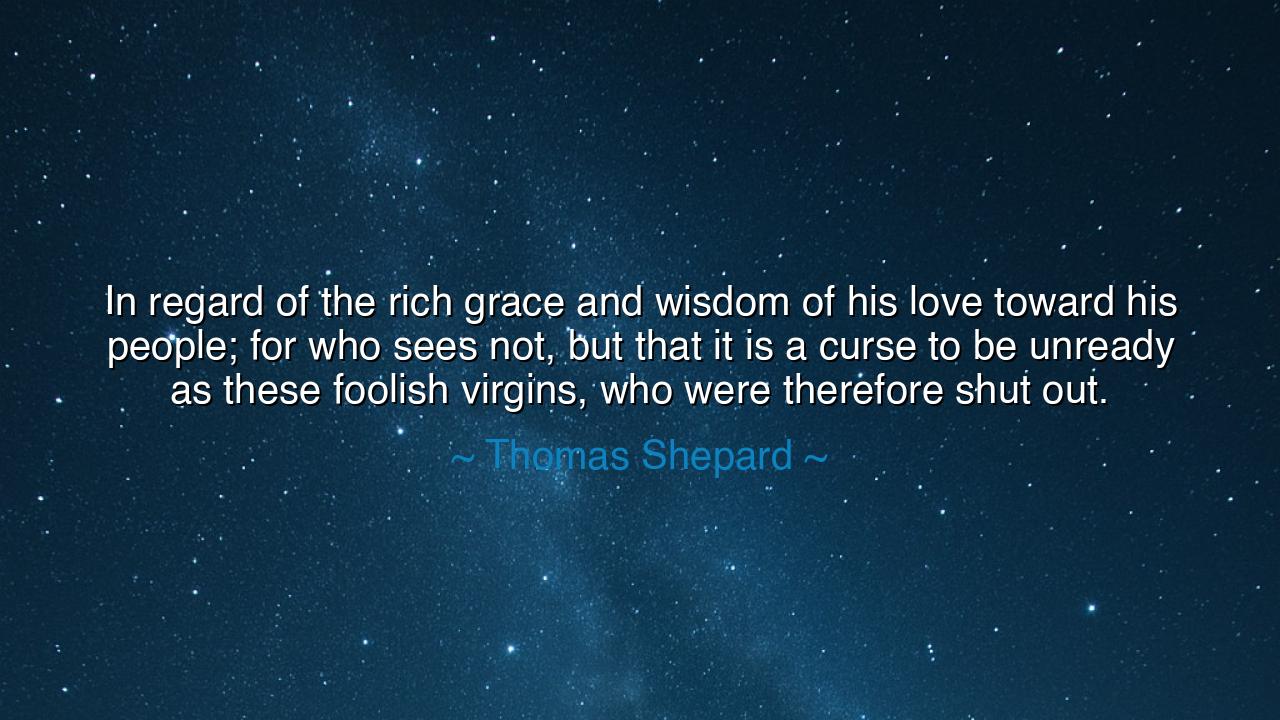
In regard of the rich grace and wisdom of his love toward his
In regard of the rich grace and wisdom of his love toward his people; for who sees not, but that it is a curse to be unready as these foolish virgins, who were therefore shut out.






Thomas Shepard, the Puritan divine and fiery preacher of New England, declares with holy urgency: “In regard of the rich grace and wisdom of his love toward his people; for who sees not, but that it is a curse to be unready as these foolish virgins, who were therefore shut out.” In these words he draws upon the parable of Christ, the story of the foolish virgins who carried no oil in their lamps and so were excluded from the wedding feast. To Shepard, their plight is not mere allegory but a solemn warning: to be unprepared for the coming of the Lord is to invite eternal loss.
The meaning is stern and luminous. The grace of God is rich and His wisdom profound, yet His people must not take it lightly. Love is freely given, but it demands readiness, vigilance, and devotion. To live carelessly, neglecting the soul, is to risk being found unready when the hour of judgment comes. Shepard’s words strike like a trumpet, reminding his hearers that unpreparedness is not merely unfortunate—it is a curse, for it separates man from the divine feast prepared for the faithful.
The parable he invokes comes from the Gospel of Matthew, where ten virgins await the bridegroom. Five were wise, carrying oil for their lamps, but five were foolish, neglecting to prepare. When the bridegroom came, the foolish virgins found themselves shut out of the feast, left in darkness while the others rejoiced. This image of exclusion became a powerful symbol in Puritan preaching, urging believers to constant vigilance, lest they too be cast aside for their negligence.
History itself reflects this lesson. Consider the fall of Jerusalem in the first century. Warnings had been given, signs were present, yet many failed to prepare. When Rome’s armies came, unready hearts and cities were swept away, while those who heeded the warnings survived. The parable of the virgins lived anew in that catastrophe: readiness is life, unpreparedness is ruin.
Therefore, let the seeker of truth learn from Shepard’s words. Grace is abundant, but it is not license for sloth. Wisdom calls us to be vigilant, to keep our lamps trimmed and burning, to live as though the bridegroom may come at any moment. To be shut out, like the foolish virgins, is the curse of carelessness; to be ready is the blessing of faithfulness. Thus, the ancient call resounds: prepare, for the day is at hand, and only the watchful shall enter the feast of the Lord.






TCtu co
Reading this, I’m struck by how moral urgency and theological depth intertwine. Shepard seems to be saying that wisdom lies in anticipating divine judgment through readiness of heart. But how does one measure such readiness? Through prayer, works, or inward faith? It raises the question of whether spiritual preparedness is ever complete. Perhaps the 'curse' isn’t punishment from God, but the self-inflicted consequence of neglecting one’s inner spiritual life.
GDGold D.dragon
This reflection feels both reverent and cautionary. It celebrates divine love but insists on human responsibility. I’m struck by the tension between grace being freely given and yet dependent on preparedness. Can something truly be a gift if it requires such readiness to receive? Maybe Shepard was reminding believers that love itself demands participation—that grace doesn’t cancel effort but calls for continual awareness and faithfulness in return.
CCCon Chuot
The image of the 'foolish virgins' being shut out is such a vivid warning. It makes me think about how fear of exclusion was used in religious teaching to encourage vigilance. But does that approach foster genuine devotion, or does it cultivate anxiety about salvation? I’d like to know how Shepard’s audience responded—did they feel inspired toward holiness or burdened by an impossible standard of spiritual readiness?
GBGia Bao
It’s interesting how this idea blends grace with judgment. On one hand, it celebrates divine wisdom and love, but on the other, it warns of exclusion for those who are not prepared. That duality feels central to Puritan theology—grace as both a gift and a test. I wonder if Shepard meant readiness as moral obedience, emotional faithfulness, or intellectual understanding. How would someone today interpret 'being ready' in modern spiritual terms?
QDNguyen Quoc Dung
I find this statement powerful but also unsettling. The notion of being 'shut out' because of unreadiness feels harsh, especially in the context of divine love. Is this more about moral vigilance or about cultivating humility and constant awareness of one’s spiritual state? I’m curious whether Shepard’s view reflects a Puritan concern for discipline or a broader warning about complacency in faith and the consequences of spiritual negligence.